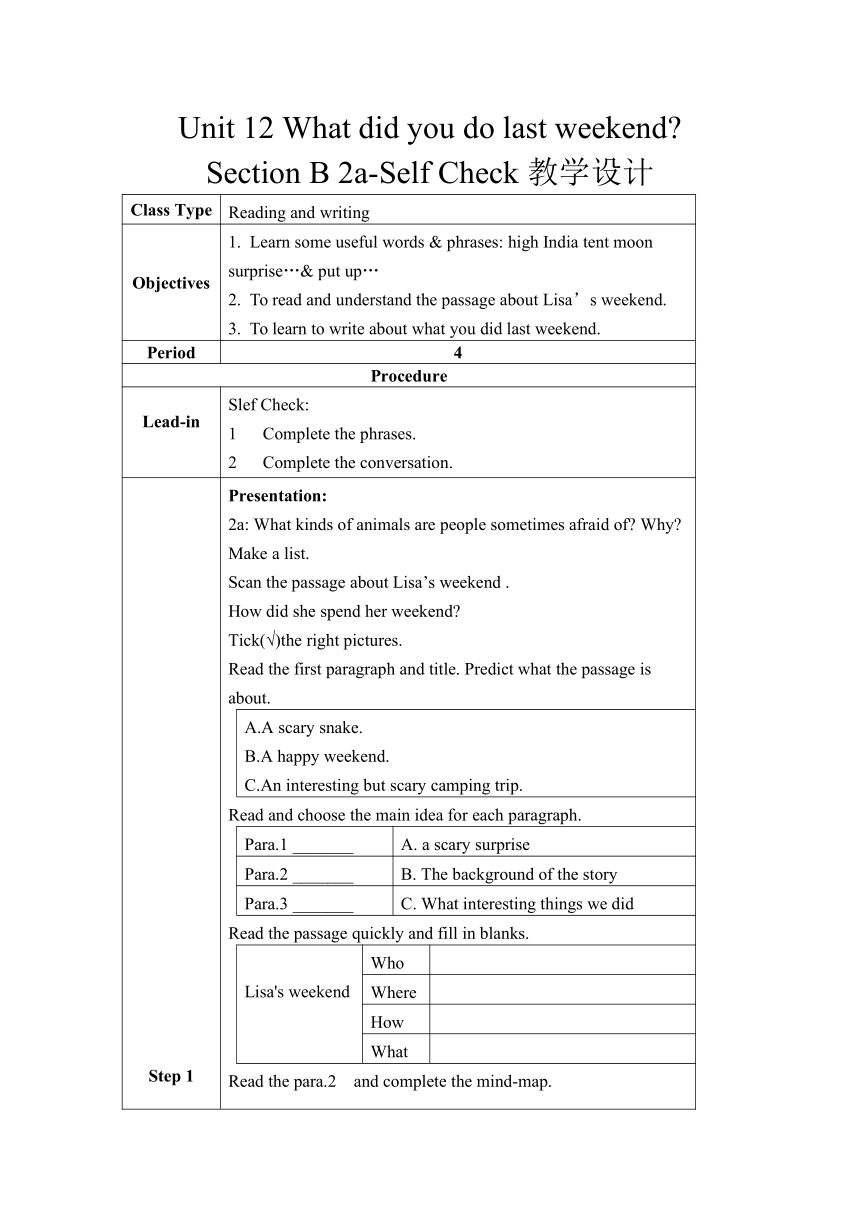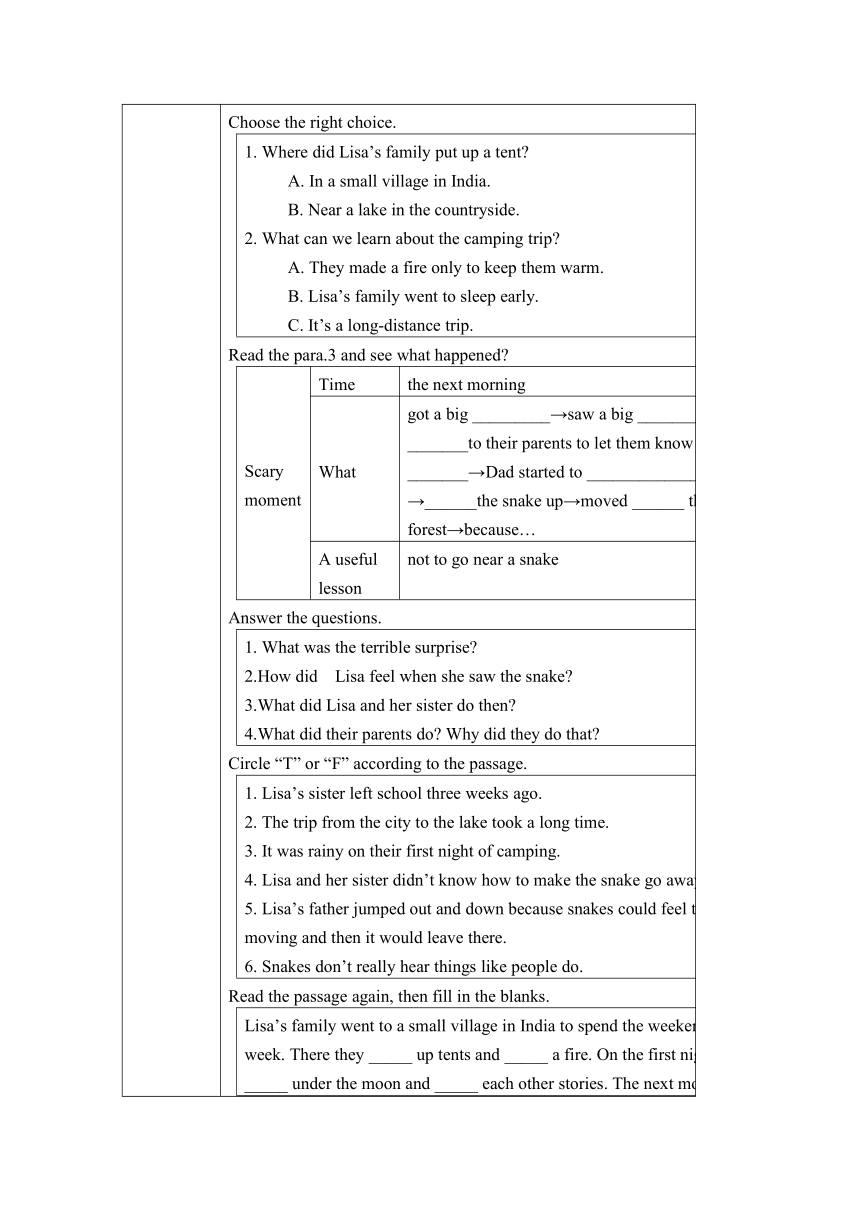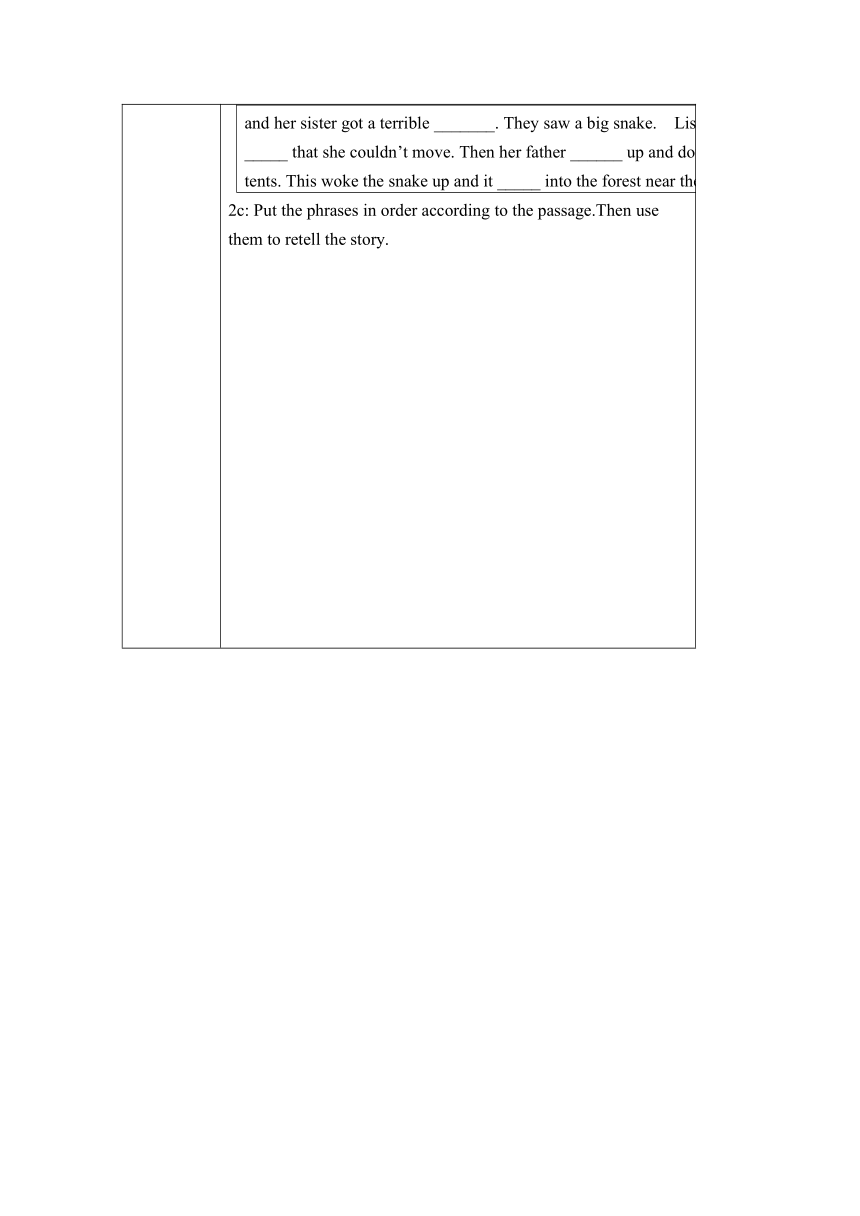Unit 12 What did you do last weekend Section B 2a-Self Check 教学设计(表格式教案)
文档属性
| 名称 | Unit 12 What did you do last weekend Section B 2a-Self Check 教学设计(表格式教案) |  | |
| 格式 | zip | ||
| 文件大小 | 22.8KB | ||
| 资源类型 | 教案 | ||
| 版本资源 | 人教新目标(Go for it)版 | ||
| 科目 | 英语 | ||
| 更新时间 | 2022-04-18 21:16:34 | ||
图片预览



文档简介
Unit 12 What did you do last weekend
Section B 2a-Self Check教学设计
Class Type Reading and writing
Objectives Learn some useful words & phrases: high India tent moon surprise…& put up… To read and understand the passage about Lisa’s weekend. To learn to write about what you did last weekend.
Period 4
Procedure
Lead-in Slef Check: 1 Complete the phrases. 2 Complete the conversation.
Step 1 Presentation: 2a: What kinds of animals are people sometimes afraid of Why Make a list. Scan the passage about Lisa’s weekend . How did she spend her weekend Tick(√)the right pictures. Read the first paragraph and title. Predict what the passage is about. A.A scary snake. B.A happy weekend. C.An interesting but scary camping trip.
Read and choose the main idea for each paragraph. Para.1 _______A. a scary surprisePara.2 _______B. The background of the storyPara.3 _______C. What interesting things we did
Read the passage quickly and fill in blanks. Lisa's weekend WhoWhereHowWhat
Read the para.2 and complete the mind-map. Choose the right choice. 1. Where did Lisa’s family put up a tent A. In a small village in India. B. Near a lake in the countryside. 2. What can we learn about the camping trip A. They made a fire only to keep them warm. B. Lisa’s family went to sleep early. C. It’s a long-distance trip.
Read the para.3 and see what happened Scary moment Timethe next morning Whatgot a big _________→saw a big _______→ _______to their parents to let them know the _______→Dad started to ___________________ →______the snake up→moved ______ the forest→because…A useful lessonnot to go near a snake
Answer the questions. 1. What was the terrible surprise 2.How did Lisa feel when she saw the snake 3.What did Lisa and her sister do then 4.What did their parents do Why did they do that
Circle “T” or “F” according to the passage. 1. Lisa’s sister left school three weeks ago. 2. The trip from the city to the lake took a long time. 3. It was rainy on their first night of camping. 4. Lisa and her sister didn’t know how to make the snake go away. 5. Lisa’s father jumped out and down because snakes could feel things moving and then it would leave there. 6. Snakes don’t really hear things like people do.
Read the passage again, then fill in the blanks. Lisa’s family went to a small village in India to spend the weekend last week. There they _____ up tents and _____ a fire. On the first night, they _____ under the moon and _____ each other stories. The next morning, Lisa and her sister got a terrible _______. They saw a big snake. Lisa was so _____ that she couldn’t move. Then her father ______ up and down in the tents. This woke the snake up and it _____ into the forest near the lake.
2c: Put the phrases in order according to the passage.Then use them to retell the story.
Step 2 Summary: There we put up our tents and make a fire to keep us warm and cook food on. put up 在句中意为“搭起,搭建”;另外还有“张贴;举起(手)”之意。 他们在这里盖了一栋新房子。 They put up a new house here. 迈克正把一张地图贴到墙上。 Mike is putting up a map on the wall. 谁知道答案?请举手。 Who knows the answer Put up your hand. put 构成的其他常见短语: put off 推迟;脱掉 put out 扑灭;赶走 put on 穿上 put back 放回原处 put down 放下 练一练: — We are going to clean our school library this weekend. Do you have any advice — You’d better ______ signs to tell all the students about that A. make up B. put up C. set up D. show up
2. But I was so tired that I went to sleep early. 但是我太累了,所以就早早睡了。 I was so scared that I couldn’t move. 我太害怕了,以至于一动都不敢动。 “ so+形容词+that 句子”,表示“太……以至于……” e.g. I got up so late that I missed the school bus. 我起得太迟了,以至于错过了校车。 3. wake up“唤醒”;宾语可以是名词或代词; 名词可以放在wake up的后面或中间; 代词应放在 wake up 的中间。 e.g. 早上你常什么时候醒来? When do you usually wake up 不要将他们吵醒。 Don’t wake them up. 【拓展延伸】so... that ... 后的从句为肯定句时,该结构可与 ... enough to ... 互相转化;其后的从句为否定句时,它可以与 too ... to ... 互相转化。 The boy got up so early that he got to school on time. = The boy got up early enough to get to school on time. 这个男孩起得很早,以至于他按时到达学校。 He is so young that he can’t go to school. =He is too young to go to school. 他那么小,以至于不能去上学。 练一练: The little baby was so happy _____ he could see a love cat. A. what B. that C. where D. how
When we looked out of our tent, we saw a big snake sleeping near the fire. look out 意为“当心;小心”,相当于 be careful。 例句:小心!汽车来了。 Look out! Here comes the car. see sb. doing sth. 意为“看见某人正在做某事”,表示看到动作正在发生; see sb. do sth. 意为“看见某人做(了)某事”, 表示看见某人做某事的全过程。 类似的感官动词还有:hear, watch, feel等,具有相同的用法。 例句: 我们看到他在教室里弹吉他了。 We saw him playing the guitar in the classroom. 我经常看到她在舞蹈教室跳舞。 I often see her dance in the dancing room. I saw her __________(play) basketball on the playground just now. 我刚才看见她正在操场上打篮球。 I saw him _______(go) out. 我看见他出去了。 3a: Look at the pictures and complete the passage. I had a busy weekend. On Saturday morning, I cleaned my room. In the afternoon, I ________________. It was a little difficult. On Saturday night, I stayed at home and ________________ cook dinner. On Sunday morning, I ________________. I read a book about history. Then in the afternoon, I ____________ with my friends. On Sunday night, I ___________. I saw an interesting talk show.
Attention: The structure of the passage. I had a ______weekend. On Saturday morning, _____________. In the afternoon, __________________. On Saturday night, ________________. On Sunday morning, _______________. In the afternoon, ___________________. On Sunday night, __________________.
3b: Write about what you did last weekend.
Step 3 Homework: 完成3b写作练习。
Section B 2a-Self Check教学设计
Class Type Reading and writing
Objectives Learn some useful words & phrases: high India tent moon surprise…& put up… To read and understand the passage about Lisa’s weekend. To learn to write about what you did last weekend.
Period 4
Procedure
Lead-in Slef Check: 1 Complete the phrases. 2 Complete the conversation.
Step 1 Presentation: 2a: What kinds of animals are people sometimes afraid of Why Make a list. Scan the passage about Lisa’s weekend . How did she spend her weekend Tick(√)the right pictures. Read the first paragraph and title. Predict what the passage is about. A.A scary snake. B.A happy weekend. C.An interesting but scary camping trip.
Read and choose the main idea for each paragraph. Para.1 _______A. a scary surprisePara.2 _______B. The background of the storyPara.3 _______C. What interesting things we did
Read the passage quickly and fill in blanks. Lisa's weekend WhoWhereHowWhat
Read the para.2 and complete the mind-map. Choose the right choice. 1. Where did Lisa’s family put up a tent A. In a small village in India. B. Near a lake in the countryside. 2. What can we learn about the camping trip A. They made a fire only to keep them warm. B. Lisa’s family went to sleep early. C. It’s a long-distance trip.
Read the para.3 and see what happened Scary moment Timethe next morning Whatgot a big _________→saw a big _______→ _______to their parents to let them know the _______→Dad started to ___________________ →______the snake up→moved ______ the forest→because…A useful lessonnot to go near a snake
Answer the questions. 1. What was the terrible surprise 2.How did Lisa feel when she saw the snake 3.What did Lisa and her sister do then 4.What did their parents do Why did they do that
Circle “T” or “F” according to the passage. 1. Lisa’s sister left school three weeks ago. 2. The trip from the city to the lake took a long time. 3. It was rainy on their first night of camping. 4. Lisa and her sister didn’t know how to make the snake go away. 5. Lisa’s father jumped out and down because snakes could feel things moving and then it would leave there. 6. Snakes don’t really hear things like people do.
Read the passage again, then fill in the blanks. Lisa’s family went to a small village in India to spend the weekend last week. There they _____ up tents and _____ a fire. On the first night, they _____ under the moon and _____ each other stories. The next morning, Lisa and her sister got a terrible _______. They saw a big snake. Lisa was so _____ that she couldn’t move. Then her father ______ up and down in the tents. This woke the snake up and it _____ into the forest near the lake.
2c: Put the phrases in order according to the passage.Then use them to retell the story.
Step 2 Summary: There we put up our tents and make a fire to keep us warm and cook food on. put up 在句中意为“搭起,搭建”;另外还有“张贴;举起(手)”之意。 他们在这里盖了一栋新房子。 They put up a new house here. 迈克正把一张地图贴到墙上。 Mike is putting up a map on the wall. 谁知道答案?请举手。 Who knows the answer Put up your hand. put 构成的其他常见短语: put off 推迟;脱掉 put out 扑灭;赶走 put on 穿上 put back 放回原处 put down 放下 练一练: — We are going to clean our school library this weekend. Do you have any advice — You’d better ______ signs to tell all the students about that A. make up B. put up C. set up D. show up
2. But I was so tired that I went to sleep early. 但是我太累了,所以就早早睡了。 I was so scared that I couldn’t move. 我太害怕了,以至于一动都不敢动。 “ so+形容词+that 句子”,表示“太……以至于……” e.g. I got up so late that I missed the school bus. 我起得太迟了,以至于错过了校车。 3. wake up“唤醒”;宾语可以是名词或代词; 名词可以放在wake up的后面或中间; 代词应放在 wake up 的中间。 e.g. 早上你常什么时候醒来? When do you usually wake up 不要将他们吵醒。 Don’t wake them up. 【拓展延伸】so... that ... 后的从句为肯定句时,该结构可与 ... enough to ... 互相转化;其后的从句为否定句时,它可以与 too ... to ... 互相转化。 The boy got up so early that he got to school on time. = The boy got up early enough to get to school on time. 这个男孩起得很早,以至于他按时到达学校。 He is so young that he can’t go to school. =He is too young to go to school. 他那么小,以至于不能去上学。 练一练: The little baby was so happy _____ he could see a love cat. A. what B. that C. where D. how
When we looked out of our tent, we saw a big snake sleeping near the fire. look out 意为“当心;小心”,相当于 be careful。 例句:小心!汽车来了。 Look out! Here comes the car. see sb. doing sth. 意为“看见某人正在做某事”,表示看到动作正在发生; see sb. do sth. 意为“看见某人做(了)某事”, 表示看见某人做某事的全过程。 类似的感官动词还有:hear, watch, feel等,具有相同的用法。 例句: 我们看到他在教室里弹吉他了。 We saw him playing the guitar in the classroom. 我经常看到她在舞蹈教室跳舞。 I often see her dance in the dancing room. I saw her __________(play) basketball on the playground just now. 我刚才看见她正在操场上打篮球。 I saw him _______(go) out. 我看见他出去了。 3a: Look at the pictures and complete the passage. I had a busy weekend. On Saturday morning, I cleaned my room. In the afternoon, I ________________. It was a little difficult. On Saturday night, I stayed at home and ________________ cook dinner. On Sunday morning, I ________________. I read a book about history. Then in the afternoon, I ____________ with my friends. On Sunday night, I ___________. I saw an interesting talk show.
Attention: The structure of the passage. I had a ______weekend. On Saturday morning, _____________. In the afternoon, __________________. On Saturday night, ________________. On Sunday morning, _______________. In the afternoon, ___________________. On Sunday night, __________________.
3b: Write about what you did last weekend.
Step 3 Homework: 完成3b写作练习。
同课章节目录
- Unit 1 Can you play the guitar?
- Section A
- Section B
- Unit 2 What time do you go to school?
- Section A
- Section B
- Unit 3 How do you get to school?
- Section A
- Section B
- Unit 4 Don't eat in class.
- Section A
- Section B
- Unit 5 Why do you like pandas?
- Section A
- Section B
- Unit 6 I'm watching TV.
- Section A
- Section B
- Review of Units 1-6
- Unit 7 It's raining!
- Section A
- Section B
- Unit 8 Is there a post office near here?
- Section A
- Section B
- Unit 9 What does he look like?
- Section A
- Section B
- Unit 10 I'd like some noodles.
- Section A
- Section B
- Unit 11 How was your school trip?
- Section A
- Section B
- Unit 12 What did you do last weekend?
- Section A
- Section B
